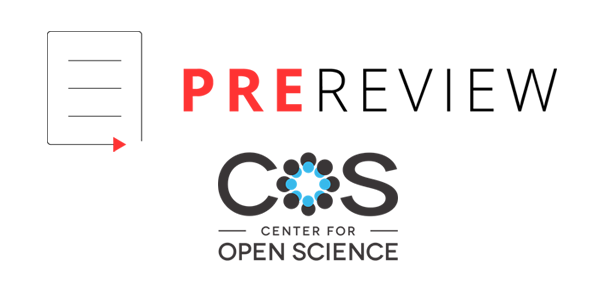
COS is excited to collaborate with PREreview to increase the trust in preprints through peer review integration opportunities for authors who choose to upload their manuscripts to OSF Preprints and its network of community servers. Learn more about the work being conducted to accelerate community review across open scholarship.
At PREreview we think about this Every. Single. Day.
We are trying to reimagine scholarly peer review through the lenses of equity, transparency, and collaboration. At PREreview, we made it our mission to enlarge the pool of peer reviewers to ensure underrepresented groups of researchers are included and whose expertise is measured by constructive contributions and community engagement and not by seniority and prestige. We envision a world in which feedback to scholarly outputs is done openly, rapidly, constructively, and by a diverse community of peers.
We offer peer review mentoring opportunities, we host live-streamed discussions on preprints, and we design and develop free and open infrastructure around which we can grow a healthy and diverse community of preprint reviewers.
Any researcher with an ORCID iD can request or write reviews of preprints hosted on preprint servers such as OSF Preprints, bioRxiv, medRxiv, preprint.org, and more, either in the form of full reports on PREreview or filling as rapid reviews—high-level reviews designed to capture the importance and quality of the research—of outbreak-related preprints on Outbreak Science Rapid PREreview (OSrPRE).
These two open platforms, funded by the Alfred P. Sloan Foundation and the Wellcome Trust, respectively, exist as two separate websites and offer slightly different features to the user. As we work towards the unification of the back and front-end of the platforms to provide an easier and more rewarding experience to the research community, we are also thinking about where we fit in the broader and ever-changing ecosystem of research dissemination and evaluation. For example, we are working in close collaboration with publishers and other organizations to establish workflows that can better connect community reviews of preprints to the journal-organized peer review workflow (read more and learn about our call to action here).
Additionally, we were recently awarded $37,000 USD by the Wellcome Trust to support the development of code and documentation for basic API integrations (e.g., linking to OSrPRE content on bioRxiv/medRxiv and EuropePMC), as well as more in depth levels of infrastructure integration with third-party sites.
The funds support a collaboration between PREreview and COS to integrate some PREreview functionalities on OSF Preprints and other preprint servers hosted by COS infrastructure.
”Trust in preprints accelerates when there are pathways for community peer reviews connected to the preprint, adding credibility to the content in a completely transparent way. We are excited about this collaboration that will bring capability to our community preprint servers, to meet their desires for open, community reviews,” said COS Product Director Nici Pfeiffer.
A feature we are exploring, for example, would allow preprint authors who are submitting to one of the COS-supported preprint servers to request feedback from the PREreview community and be notified of any contributions. Other forms of integration we are exploring include giving the ability to COS users to read reviews on the site or even fill them out directly on the site, similarly to what one can already do via our browser extension.
These are just some of our initial ideas. We would like to hear your ideas on how this collaboration can best support your needs and make your experience easier and more rewarding. Fill out this quick survey to help us better understand your needs.
This work will not only support the ever increasing demand for community review of preprints improving access to vetted scientific content, but will also serve as a testing bed to develop more open and integrated ways of evaluating scholarly work.

6218 Georgia Avenue NW, Suite #1, Unit 3189
Washington, DC 20011
Email: contact@cos.io

Unless otherwise noted, this site is licensed under a Creative Commons Attribution 4.0 International (CC BY 4.0) License.
Responsible stewards of your support
COS has earned top recognition from Charity Navigator and Candid (formerly GuideStar) for our financial transparency and accountability to our mission. COS and the OSF were also awarded SOC2 accreditation in 2023 after an independent assessment of our security and procedures by the American Institute of CPAs (AICPA).
We invite all of our sponsors, partners, and members of the community to learn more about how our organization operates, our impact, our financial performance, and our nonprofit status.